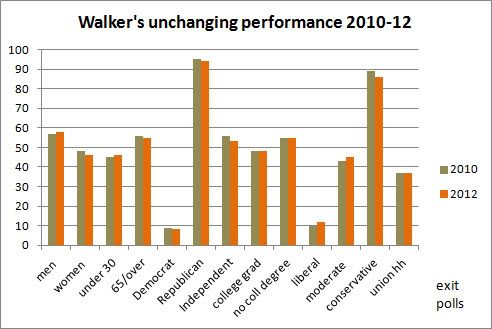Of course the Republicans will want to spin this as bad news for President Obama and good news for Mitt Romney. That is just not true.
In fact, exit polls show Walker winning 17 percent of Obama supporters — much higher than Democrat Tom Barrett’s 6 percent of Mitt Romney supporters. Overall, the electorate that turned out today is backing Obama by a significant margin: 52 percent to 43 percent.My immediate question when I heard this was "how can a Walker voter support Obama?" Here's how.
Asked about the use of recall, 60% said it should be reserved for misconduct, 27% said it should be available for any reason, and 10% said it should never be used.Those numbers translate into 70% of Wisconsin voters who don't agree with a recall election under these circumstances. It would be interesting to know whether or not that influenced many people in their vote yesterday.
From that same article, we learn that the electorate in Wisconsin yesterday wasn't very much different than the one that made Walker the Governor in 2010.
In the end, after all the ground-breaking rancor and searing conflict and mind-boggling money and crushing attention, Scott Walker’s 2012 victory for governor looked a lot like his 2010 victory for governor...Here's a chart they put together comparing exit poll information from 2010 and the recall.
This was a volatile conflict but not a volatile electorate. Instead, voters showed every sign of being fixed in place when it came to their views of Walker. According to the exit polls Tuesday, only 8% of voters decided their vote in the last few days of the election.

The lack of volatility and the fact that only 8% of the electorate made up their minds in the last few days also challenges the conventional wisdom coming from the left that the Walker win is all about his money advantage. With these kinds of numbers its hard to imagine that all the advertising had much impact on the outcome.
Finally, it seems that all the talk about over 100% turnout in Wisconsin yesterday turned out not to be the case - at least not statewide. Its hard to know what to expect in an unprecedented election like this, but the truth is that turnout was higher than 2010, but 400,000 votes (13%) lower than in 2012.
Yesterday, about 2.5 million people voted. In 2010, it was 2.15 million. In 2008, it was 2.93 million.I'm left with a feeling of pride in the efforts of all the Democrats in Wisconsin who worked so hard to change an untenable situation in their state. But it was a HUGE uphill battle with very unique barriers to overcome. So I'm not prepared to find much there that speaks to what the rest of us face in the upcoming national election.




NCrissieB at BPI Campus looked at the same data and reached the same conclusion. Yesterday was a referendum on recalls, not an endorsement of Gov. Walker or the GOP agenda.
ReplyDeleteWhat's interesting (and a bit disheartening) about this is to watch previous assumptions on both sides create a narrative that isn't supported by the facts. It happens so often in politics.
DeleteExactly. I didn't know the results when I went to sleep last night, but I didn't expect to wake up and find the result was a referendum on recalls. But the data really bear that out.
DeleteGovernor Walker had a 49% base: 9% who oppose recalls in all cases, plus 40% who support recalls only for "official misconduct" and apparently did not think he had committed any. (Another 20% support recalls only for "official misconduct" and voted for Barrett, so they apparently thought Gov. Walker had committed some.)
Among the 29% of voters who support recalls in any case, 26% voted for Barrett and 3% for Walker. To me, that looks like a referendum on recalls ... end of story.
Of course, the pundits wouldn't have jobs if they couldn't make up other stories....
I cannot recall (no pun intended, I promise) any other president whose fortunes were so frequently tied to the outcome of special elections, recalls, etc. at the state level and in Congressional districts. It seems like EVERY Dem loss is pinned to Obama by the media and the PL, while the victories are spun as "in spite of" his "losing the base." It's just tiresome. Local elections are LOCAL, and they really, really aren't a referendum on the national scene. They are even less of a bellwether when they are recalls elections or special elections or other special circumstances outside of the usual election cycle. Thank you for running these numbers for us.
ReplyDeleteWhat about those Dem voters that stayed home in 2010? Did they stay home again?
ReplyDeleteWhat about those Dem voters that stayed home in 2010? Did they stay home again?
ReplyDeleteHi
ReplyDeletewe are in the 21st century and some are living in the 22nd. Pls stop giving any importance to polls. Scott walker win tells you the democray lost. Remember my words, on november 6th night, you will be surprized to see how the movement against democracy is at its helm. Did you see the stock market in the last two days?. Why employment numbers are low even when everyone is reporting profits?. Sitting on the money is not because they are scared. It is a way they are harrassing the ONE that they dont like. there comes a day (it better come soon) the novel democracy will select a US president like how they select POPE. billionairs and some billionairs will select the president. The reason they are delaying this drastic change is-they are searching for an excuse to convince those 50% people who vote on the basis of something other than tha is written for democracy